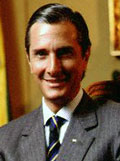Fernando Afonso Collor de Mello was born in the family of an Alagoas politician, Arnon Afonso de Farias Melo, who was governor of this state in 1951-1956. Educated in economics and journalism at the University of Brasília, Collor worked for his family's media group. His political career began with the appointment as prefect (mayor) of Maceió (1979-1982). Enlisted as a candidate of the Social Democratic Party (Partido Democrático Social), Collor was elected federal deputy for Alagoas (1983-1986). Supported next time by the Brazilian Democratic Movement Party (Partido do Movimento Democrático Brasileiro), he was elected Governor of the State of Alagoas (15 Mar 1987 - 14 May 1989). Relatively unknown to the Brazilian electorate, Collor and his National Reconstruction Party (Partido da Reconstrução Nacional, PRN) entered a crowded race for the presidential succession in 1989. Backed by the powerful media, Collor defeated his opponent, Luís Inácio Lula da Silva, in the runoff election on 17 Dec 1989 and took office on 15 Mar 1990. The youngest president ever, and the first to be directly elected since 1960, Collor announced the New Brazil plan, providing for sweeping reforms targeted at ending the economic crisis that had plagued Brazil for a decade. Despite ambitious program of actions and drastic measures, the Collor administration achieved mixed results, while national economy continued to be in a deep recession. Congressional elections in December 1990 revealed disillusionment of voters giving Collor's PRN less than 10 percent in the Chamber of Deputies. In May 1992, the statements made by the president's brother, Pedro Collor de Mello, caused an explosion in the political situation: the president and his advisors were accused of receiving enormous amounts of money from private companies as a kickback for awarding profitable contracts. A four-month investigation culminated in a televised voting in the Chamber of Deputies (29 Sep 1992). The Chamber voted [1] to impeach Collor and consequently to suspend him from office for 180 days. Maintaining his innocence, Collor complied with the parliamentary resolution and temporarily transferred the presidency to Vice President Itamar Augusto Cautiero Franco (2 Oct 1992). With no prospects for acquittal, Collor submitted his resignation minutes after the Federal Senate opened his impeachment trial (29 Dec 1992). The Senate, nevertheless, completed the trial, convicting Collor of the corruption charges and barring him from holding public office for a period of eight years. |
| Candidate |
Popular vote (1st round: 15 Nov 1989) [2] |
Popular vote (2nd round: 17 Dec 1989) [2] |
| Fernando Afonso Collor de Mello |
22,611,011 (28.52%) |
35,089,998 (49.94%) |
| Luiz Inácio Lula da Silva |
11,622,673 (16.08%) |
31,076,364 (44.23%) |
| Leonel de Moura Brizola |
11,168,228 (15.45%) |
- |
| Mário Covas Júnior |
7,790,392 (10.78%) |
- |
| Paulo Salim Maluf |
5,986,575 (8.28%) |
- |
| Guilherme Afif Domingos |
3,272,462 (4.53%) |
- |
| Ulisses Silveira Guimarães |
3,204,932 (4.43%) |
- |
| Roberto João Pereira Freire |
769,123 (1.06%) |
- |
| Antônio Aureliano Chaves de Mendonça |
600,838 (0.83%) |
- |
| Ronaldo Ramos Caiado |
488,846 (0.68%) |
- |
| Afonso Alves de Camargo Neto |
379,286 (0.52%) |
- |
| Enéas Ferreira Carneiro |
360,561 (0.50%) |
- |
| JoséAlcides Marronzinho de Oliveira |
238,425 (0.33%) |
- |
| Paulo Gontijo |
198,719 (0.27%) |
- |
| Zamir JoséTeixeira |
187,155 (0.26%) |
- |
| Lívia Maria Ledo Pio de Abreu |
179,922 (0.25%) |
- |
| Eudes de Oliveira Mattar |
162,350 (0.22%) |
- |
| Fernando Paulo Nagler Gabeira |
125,842 (0.17%) |
- |
| Celso Teixeira Brant |
109,909 (0.15%) |
- |
| Antônio dos Santos Pedreira |
86,114 (0.12%) |
- |
| Manoel Antônio de Oliveira Horta |
83,286 (0.12%) |
- |
| Armando Corrêa da Silva |
4,363 (0.01%) |
- |
| blank |
1,176,413 (1.6%) |
986,446 (1.40%) |
| void |
3,473,484 (4.4%) |
3,107,893 (4.42%) |
|

